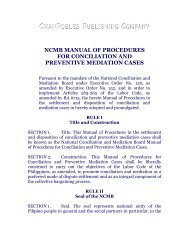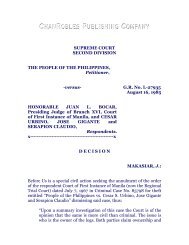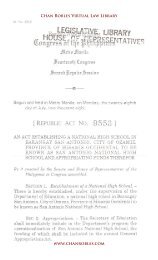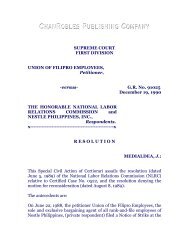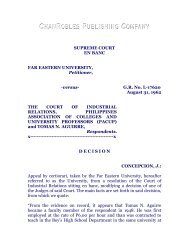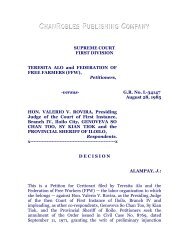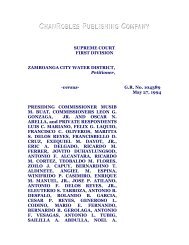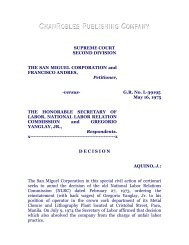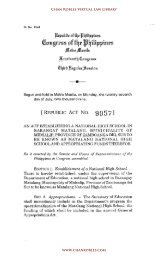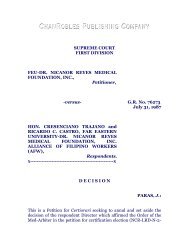Pre-Week Guide on Labor <strong>Law</strong> 2006 Bar Examinations Prof. Joselito Guianan <strong>Chan</strong>fact of dismissal, it can be said that the cases were effectively removed from the jurisdiction ofthe Voluntary Arbitrator, thus placing them within the jurisdiction of the Labor Arbiter. Wherethe dispute is just in the interpretation, implementation or enforcement stage, it may be referred tothe grievance machinery set up in the CBA, or brought to voluntary arbitration. But, where therewas already actual termination, with alleged violation of the employee’s rights, it is alreadycognizable by the Labor Arbiter.15. Do Labor Arbiters have jurisdiction over monetary claims <strong>and</strong> illegal dismissal cases ofemployees of cooperatives?a. Members of cooperatives are not employees.Cooperatives organized under Republic Act No. 6938, otherwise known as “TheCooperative Code of the Philippines” are composed of members. Issues on the termination oftheir membership with the cooperative do not fall within the jurisdiction of the Labor Arbiters.b. Labor Arbiters have jurisdiction over illegal dismissal casesof employees of cooperatives.In the case of Perpetual Help Credit Cooperative, Inc. vs. Faburada, [G. R. No.121948, October 8, 2001], the Supreme Court ruled that employees of cooperatives (asdistinguished from members thereof) are covered by the Labor Code <strong>and</strong>, therefore, LaborArbiters have jurisdiction over their claims. There is no evidence in this case that privaterespondents are members of petitioner cooperative <strong>and</strong> even if they are, the dispute is aboutpayment of wages, overtime pay, rest day <strong>and</strong> termination of employment. Under Art. 217 of theLabor Code, these disputes are within the original <strong>and</strong> exclusive jurisdiction of the Labor Arbiter.16. What are the cases which do not fall under the jurisdiction of the Labor Arbiters?a. JURISDICTION OVER INTRA-CORPORATE DISPUTES. -Labor Arbiters have nojurisdiction over termination of corporate officers <strong>and</strong> stockholders which, under the law,is considered intra-corporate dispute. It must be emphasized that a corporate officer’sdismissal is always a corporate act <strong>and</strong>/or intra-corporate controversy <strong>and</strong> that nature isnot altered by the reason or wisdom which the Board of Directors may have in takingsuch action. The Regional Trial Courts (not SEC) now have jurisdiction under R. A.8799 (Securities Regulation Act of 2000). Jurisdiction of RTC includes adjudication ofmonetary claims of the corporate officer who was dismissed, (such as unpaid salaries,leaves, 13 th month pay, bonuses, etc.), damages <strong>and</strong> attorney's fees. (Lozon vs. NLRC, G.R. No. 107660, Jan. 02, 1995, 240 SCRA 1)Who are corporate officers? There are specifically three (3) officers which acorporation must have under the statute: president, secretary, <strong>and</strong> treasurer. However,the law does not limit corporate officers to these three. Section 25 of the CorporationCode gives corporations the widest latitude to provide for such other offices, as they maydeem necessary. The by-laws may <strong>and</strong> usually do provide for such other officers, e.g.,vice president, cashier, auditor, <strong>and</strong> general manager. Consequently, the Supreme Courthas held that one who is included in the by-laws of a corporation in its roster of corporateofficers is an officer of said corporation <strong>and</strong> not a mere employee.But what about if the position is not included in the roster of officers in the Bylaws?Does the holder of the position to be considered a corporate officer?In the case of Nacpil vs. Intercontinental Broadcasting Corporation, [G. R.No. 144767, March 21, 2002], petitioner argued that he is not a corporate officer of theIBC but an employee thereof since he had not been elected nor appointed as Comptroller<strong>and</strong> Assistant Manager by the IBC’s Board of Directors. He points out that he hadactually been appointed as such on January 11, 1995 by the IBC’s General Manager. Insupport of his argument, petitioner underscores the fact that the IBC’s By-<strong>Law</strong>s does noteven include the position of comptroller in its roster of corporate officers. He, therefore,contended that his dismissal was a controversy falling within the jurisdiction of the laborcourts.4
Pre-Week Guide on Labor <strong>Law</strong> 2006 Bar Examinations Prof. Joselito Guianan <strong>Chan</strong>The Supreme Court considered petitioner’s argument untenable. It held that evenassuming that he was in fact appointed by the General Manager, such appointment wassubsequently approved by the Board of Directors of the IBC. That the position ofComptroller is not expressly mentioned among the officers of the IBC in the by-laws is ofno moment, because the IBC’s Board of Directors is empowered under Section 25 of theCorporation Code <strong>and</strong> under the corporation’s by-laws to appoint such other officers as itmay deem necessary. Consequently, as petitioner’s appointment as comptroller requiredthe approval <strong>and</strong> formal action of the IBC’s Board of Directors to become valid, it isclear, therefore, that petitioner is a corporate officer whose dismissal may be the subjectof a controversy cognizable by the SEC under Section 5(c) of P.D. 902-A (now by theRTC under R. A. No. 8799) which includes controversies involving both election <strong>and</strong>appointment of corporate directors, trustees, officers, <strong>and</strong> managers. Had petitioner beenan ordinary employee, such board action would not have been required.It must be noted that the Supreme Court has held that in most cases, the “by-lawsmay <strong>and</strong> usually do provide for such other officers,” (Union Motors vs. NLRC, 314 SCRA531, 539 [1999]) <strong>and</strong> that where a corporate officer is not specifically indicated in theroster of corporate officers in the by-laws of a corporation, the Board of Directors mayalso be empowered under the by-laws to create additional officers as may be necessary.(Tabang vs. NLRC, 266 SCRA 462 [1997]).One who rose from the ranks is a regular employee <strong>and</strong> not a mere corporate officer.In Prudential Bank <strong>and</strong> Trust Company vs. Reyes, [G. R. No. 141093,February 20, 2001], the Assistant Vice-President was appointed Accounting Clerk by theBank on July 14, 1963. From that position, she rose to become supervisor. Then in 1982,she was appointed Assistant Vice-President which she occupied until her illegal dismissalon July 19, 1991. The Bank’s contention that she merely holds an elective position <strong>and</strong>that, in effect, she is not a regular employee is belied by the nature of her work <strong>and</strong> herlength of service with the Bank. As earlier stated, she rose from the ranks <strong>and</strong> has beenemployed with the Bank since 1963 until the termination of her employment in 1991. AsAssistant Vice President of the foreign de<strong>part</strong>ment of the Bank, she is tasked, amongothers, to collect checks drawn against overseas banks payable in foreign currency <strong>and</strong> toensure the collection of foreign bills or checks purchased, including the signing oftransmittal letters covering the same. It has been stated that “the primary st<strong>and</strong>ard ofdetermining regular employment is the reasonable connection between the <strong>part</strong>icularactivity performed by the employee in relation to the usual trade or business of theemployer.” Additionally, “an employee is regular because of the nature of work <strong>and</strong> thelength of service, not because of the mode or even the reason for hiring them.” AsAssistant Vice-President of the Foreign De<strong>part</strong>ment of the Bank she performs tasksintegral to the operations of the bank <strong>and</strong> her length of service with the bank totaling 28years speaks volumes of her status as a regular employee of the bank. In fine, as aregular employee, she is entitled to security of tenure; that is, her services may beterminated only for a just or authorized cause. This being in truth a case of illegaldismissal, it is no wonder then that the Bank endeavored to the very end to establish lossof trust <strong>and</strong> confidence <strong>and</strong> serious misconduct on the <strong>part</strong> of private respondent but to noavail.b. JURISDICTION OVER GOVERNMENT CORPORATIONS WITH ORIGINALCHARTERS. - Labor Arbiters have jurisdiction over cases involving employees ofgovernment-owned or controlled corporations without original charters (organized underthe Corporation Code). They have no jurisdiction if entity has original charter.c. JURISDICTION OVER IMMUNED ENTITIES. - Labor Arbiters have no jurisdictionover labor cases involving entities immuned from suit. Exception: when said entitiesperform proprietary activities (as distinguished from governmental functions).For instance, in an illegal dismissal case filed against the Asian DevelopmentBank (ADB), the Supreme Court ruled that it enjoys immunity from legal process ofevery form <strong>and</strong>, therefore, the suit cannot prosper. ADB's officers, on their <strong>part</strong>, enjoyimmunity in respect of all acts performed by them in their official capacity. The Charter<strong>and</strong> the Headquarters Agreement granting these immunities <strong>and</strong> privileges are treaty5


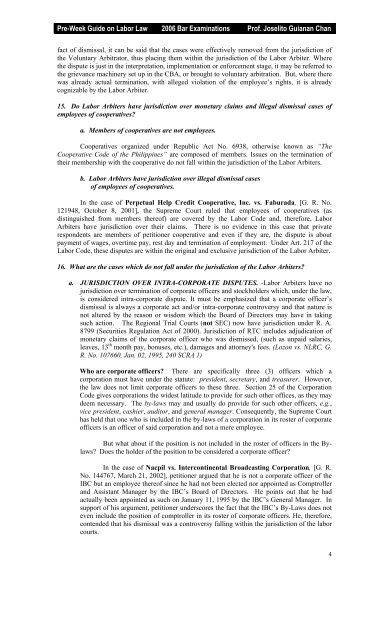
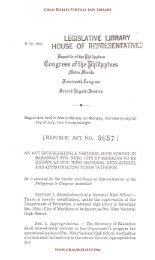
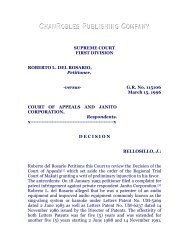
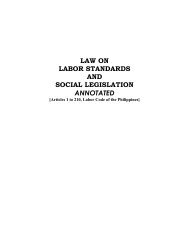
![Aurelio vs. NLRC, (221 SCRA 432 [1993]) - Chan Robles and ...](https://img.yumpu.com/51280528/1/190x245/aurelio-vs-nlrc-221-scra-432-1993-chan-robles-and-.jpg?quality=85)
